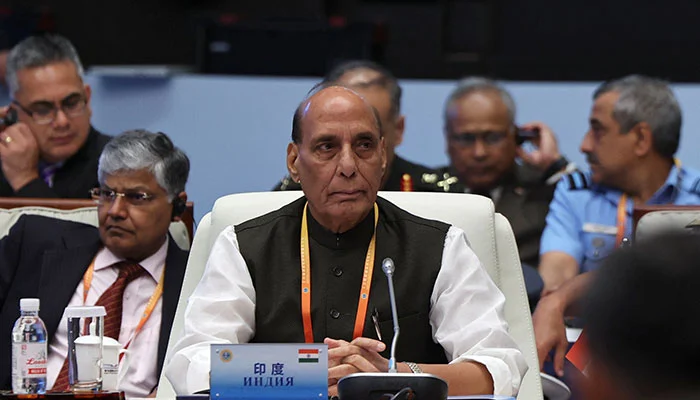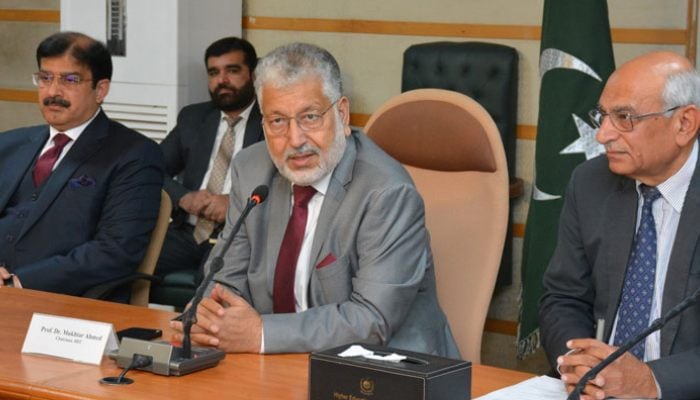India has reportedly declined to sign a joint statement issued by a high-level Shanghai Cooperation Organisation (SCO) meeting in China after it mentioned terrorist activities in Pakistan’s Balochistan.
Singh, as reported by the Times of India, the SCO Defence Ministers’ meeting’s joint document also failed to feature any reference to the Pahalgam incident — which saw several tourists being killed in Indian Illegally Occupied Jammu and Kashmir (IIOJK).
The SCO huddle, being held in Qingdao and bringing together 10 member states’ ministers — including those from Russia, China, India and Pakistan. The meeting decided to not issue a joint statement due to India’s refusal and lack of consensus on the terrorism issue.
The development comes a day after Pakistan’s Foreign Office clarified that Defence Minister Khawaja Asif will be representing Islamabad at the SCO moot, however, there was no scheduled meeting between him and his Indian counterpart Singh.
The clarification followed claims by Turkish media that there was a possibility of a meeting between Pakistani and Indian defence ministers — marking the first such incident after the recent armed conflict between the two nuclear-armed neighbours which saw both sides carrying out cross-border strikes.
Earlier, National Security Advisor (NSA) Lt Gen Asim Malik attended the 20th meeting of the secretaries of the Security Council of SCO Member States on Tuesday in Beijing, China.
In addition to interacting with Chinese leadership, during the visit, the NSA delivered an important speech reiterating Pakistan’s stance on the global, and regional situation and contributions to peace and security, besides meetings with key leadership of SCO countries to enhance bilateral and security cooperation.
Speaking at the SCO meeting, Singh accentuated New Delhi’s concerns regarding terrorism and urged the member countries to take a principled stance on the matter, reported NDTV.
“The biggest challenges in our region are related to peace, security and trust deficit [….] India believes that reformed multilateralism can help build cooperation to prevent conflict between countries by creating mechanisms for dialogue and collaboration,” the Indian defence czar said.
‘Common threat of terrorism’
Attending the same huddle, Defence Minister Asif, pledged Islamabad’s unwavering commitment to SCO’s principles and objectives.
Expressing concern over ongoing conflicts around the world, the defence czar stressed that a peaceful and stable Afghanistan was essential for achieving a shared vision of sustainable prosperity in the region.
“The international community should ensure a peaceful resolution of the long-standing unresolved conflicts of Kashmir [as such] unresolved conflicts remain a constant threat to global peace and security,” he remarked.
Touching upon the issue of terrorism, Asif termed terrorism as a common threat which needed to be dealt with collectively.
“All states should refrain from politicising joint efforts against terrorism,” the minister added.
He further stressed that it remains a common threat and must be addressed collectively. Pakistan calls on all states to desist from politicising the joint effort of the international community to fight the means of terrorism to deflect attention from their internal failures. He reaffirmed Pakistan’s resolute condemnation of all forms and manifestations of terrorism.
Also, Asif said that Pakistan condemned the terrorist attack in the internationally recognised disputed and illegally occupied region of IIOJK and said: “We call upon all states to hold these states to account who planned, financed and sponsored terrorist attacks such as Jaffar Express in Balochistan”.
In this regard, he urged for the peaceful settlement of disputes through dialogue, mediation, and preventive diplomacy.
Meanwhile, on the sidelines of the meeting, the minister held bilateral engagements with his counterparts from Tajikistan, Iran, Kazakhstan and China, exchanging views on shared security priorities and deepening collaboration.




